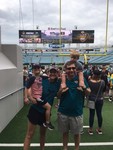

A new campaign focused on raising awareness about the capabilities of those with Down syndrome, autism spectrum disorder and other intellectual and developmental differences (IDDs) has recently sprung up in Northeast Florida, and local families are jumping on board.
“We all decided that Jacksonville was ripe for an awareness campaign about what a valuable asset people with IDDs are in their homes and their communities and families,” said Susan Edelman, vice president of strategic communications for The Community Foundation for Northeast Florida.
According to Edelman, the idea for the Connectable campaign – which The Community Foundation helped to launch – began with Delores Barr Weaver, a generous donor. Weaver, after continually hearing those with IDDs referred to as “disabled,” felt the true potential of those individuals was not being acknowledged.
“We hired Daigle Creative to create a year-long messaging campaign, and that’s how The Community Foundation is involved,” Edelman said. “Our job as a community foundation is to help our donors realize whatever their passion for philanthropy is. This was one of Mrs. Weaver’s many interests, so we helped to bring it to fruition.”
Edelman said the main focuses of the campaign are helping those with IDDs to get more involved and connected within their communities, and making their abilities known to employers—two goals that Ponte Vedra Beach resident and mother Jessica Tiedeberg whole-heartedly agrees with.
“These kids have to be out in the community,” she said. “The more they’re in the community and the more they’re involved with things, the more people learn about them and they don’t fear that disability anymore.”
A board member for the Down Syndrome Association of Jacksonville, Tiedeberg has two 5-year-old twin boys, Crawford and Whittaker. While Crawford is what those with the Connectable campaign would call “typical,” Whittaker has Down syndrome, but according to Tiedeberg, the family does not hold either one of them to a higher standard than the other.
“We try to treat Whit exactly the same way we treat Crawford,” she explained. “We expect them both to be kind and respectful, and I think that’s how we’ve really seen Whit flourish. You need to have those same expectations.”
Those expectations also extend to Whit’s future role in the community.
“We expect that he will be a productive member of society,” Tiedberg said. “We don’t know what that will look like, but we expect something, and we know that starts just by being out there and around people. That’s why we’re such huge proponents of this, and we’re so excited about the campaign.”
For Tiedeberg, the Connectable campaign is important because it encourages others to see the potential that she sees in her son and others with IDDs.
“They have abilities,” she said. “They may not look the same as everyone else, but they have something to give back to the community. And that’s what the Connectable campaign is about—getting all of us to see and to show that we are one community, and we all have something we can offer.”
Visit http://connectablejax.com/ for more information on the Connectable campaign.